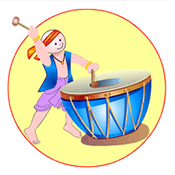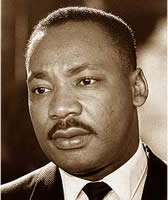
Dimdima
Online Children's Magazine from India

Dimdima
Online Children's Magazine from India

Hello, and welcome, to all my friends across the globe. The cold winter days are making me very sleepy, and when I sleep, I like to dream. The sad part of the matter is that upon waking up, my dreams evaporate. There have been some brave and courageous leaders in our world, however, who have worked hard to make their dreams come true. Today, I will tell you about a brave American, Dr. Martin Luther King Jr., who had a powerful vision for the people of his community.
Just like Mahatma Gandhi worked for the betterment of the untouchables in India, Martin Luther King, Jr., was a church minister who worked for racial equality in the United States of America. This prominent African American leader was born on January 15, 1929, in Atlanta, Georgia. He belonged to a very religious family, and both his parents were well educated. His father was a minister in the local church, while his mother was a schoolteacher. At school, Martin excelled in studies. Life was difficult for “people of color” in those days and they had to face discrimination and segregation at many different levels. Little Martin was very disturbed when he realized that he could not attend the same school that his best friend attended because they belonged to different races. His friend was “white” and he was “black.”
During his college years Dr. King became deeply attracted to the teachings of Mahatma Gandhi and Henry David Thoreau. He noted that many great changes could be brought about in a peaceful manner. During the 1950's, Dr. King became active in the movement for civil rights and racial equality. He participated in the Montgomery, Alabama bus boycott and many other peaceful demonstrations that protested the unfair treatment of African-Americans. On August 28, 1963, at a huge gathering of more than 200,000 people of all races in front of the Lincoln Memorial in Washington, D.C., Dr. King uttered these oft-quoted lines:
"I have a dream that one day on the red hills of Georgia the sons of former slaves and the sons of former slaveholders will be able to sit down together at the table of brotherhood....I have a dream that my four little children will one day live in a nation where they will not be judged by the color of their skin, but by the content of their character."
For his untiring efforts in the Civil Disobedience Movement, Dr. King won the Nobel Peace Prize in 1964. Not long afterwards, his efforts bore rich fruit. The U.S. Congress passed strict laws that prohibited discrimination in voting, education, employment, housing, and public accommodations.
As Dr. King’s popularity grew, his enemies became bitter and sought ways to bring about his downfall. Like many other great leaders, Dr. King met with a sad and untimely end when he was assassinated on April 4, 1968, in Memphis, Tennessee. In November, 1983, President Ronald Reagan signed a legislation that created a new federal holiday to celebrate the life and dreams of this great social thinker.
Since 1986, the third Monday of January has been set aside as Dr. Martin Luther King, Jr. Day. On this federal holiday schools, federal offices, post offices and banks across America remain closed as a mark of respect for the famous social leader. Generally, such an honor is reserved only for military or religious figures. Dr. King is the only American besides George Washington to have a national holiday designated for his birthday. By honoring the departed leader thus, Americans remember the injustices that Dr. King fought. We also remember his fight for the freedom, equality, and dignity of all races and peoples, through the use of nonviolent approaches. This holiday is indeed a rich and powerful tribute to Dr. King's struggles and achievements.
Dimdima is the Sanskrit word for ‘drumbeat’. In olden days, victory in battle was heralded by the beat of drums or any important news to be conveyed to the people used to be accompanied with drumbeats.
Bharatiya Vidya Bhavan
K. M Munshi Marg,
Chowpatty, Mumbai - 400 007
email : editor@dimdima.com
Bharatiya Vidya Bhavan
505, Sane Guruji Marg,
Tardeo, Mumbai - 400 034
email : promo@dimdima.com
Dimdima.com, the Children's Website of Bharatiya Vidya Bhavan launched in 2000 and came out with a Printed version of Dimdima Magazine in 2004. At present the Printed Version have more than 35,000 subscribers from India and Abroad.